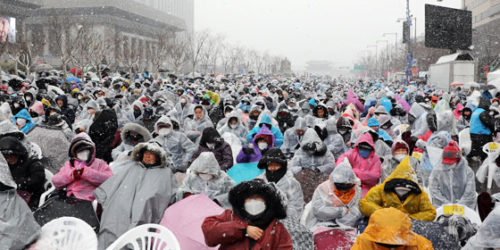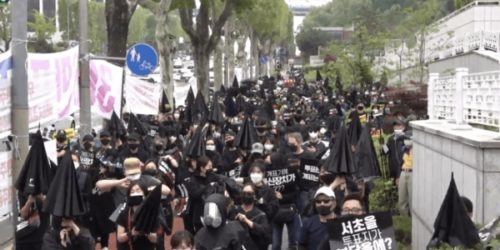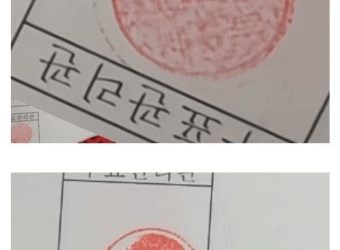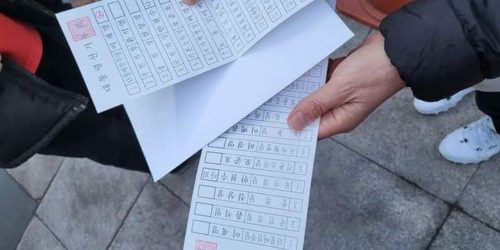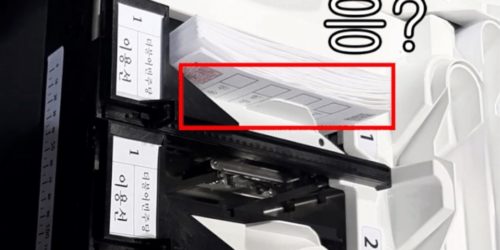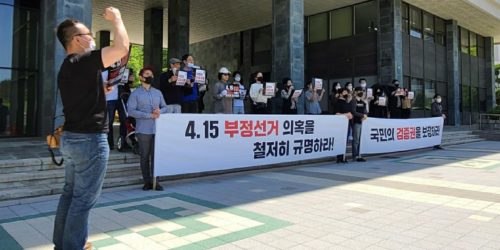The Republic of Korea’s Rigged Elections and Its Implications on the World Order, Letter from former Ambassadors, Vice Minister
2020-6-10, Former South Korean ambassadors and vice minister (see below for signatories)
The letter below is a plea for an international intervention in the Republic of Korea’s (ROK) 2020 general election results, which have been rigged from the start and have strong global implications for other countries. The intention is also to inform and report on the crisis facing the ROK’s liberal democratic system which may eventually threaten the world order.
Sources for specific information are available upon request.
Signatories in alphabetical order
BYUN, Seung Gook, Former Ambassador to Portugal
CHO, Won Il, Former Ambassador to Viet Nam
CHUNG, Jin Ho, Former Ambassador to Peru
HONG, Seung Mok, Former Ambassador to Nepal
KIM, Suk Woo, Former Vice Minister of Ministry of Unification
KIM, Young Ki, Former Ambassador to Turkey
LEE, Byung Wha, Former Ambassador to Norway
LEE, Jaichun, Former Ambassador to Russia
LEE, Sang Gu, Former Ambassador to Malaysia
LEE, Suk Jo, Former Ambassador to Kenya
PARK, Dong Soon, Former Ambassador to Israel
———-
The Republic of Korea’s general elections held on April 15, 2020 resulted in 180 seats for the ruling party and 103 for the leading opposition party, out of a total of 300 seats.
Based on statistics, many experts in Korea and abroad, including Professor Walter Mebane of the University of Michigan, Professor Richard DeMillo of the Georgia Institute of Technology, Professor Young-Ah Park of Myongji University, and Professor Sung-Hyun Park of Seoul National University, have concluded that the 2020 general elections were highly likely to have been fraudulent.
There is much circumstantial and fragmentary evidence that supports the claim, but the Korean government, including the National Election Commission(NEC) and the courts, is ignoring it. The media, under the strong influence of the government, is also silent. Nevertheless, we are raising this issue because we believe that the rigged elections using state-of-the-art electronic equipment may eventually harm the current liberal democratic world order.
Background: 2020 General elections
This year’s general elections were held at a crucial moment for Korea’s fragile liberal democratic system. Current President Moon Jae-in made a campaign promise to revise the current constitution based on liberal democracy to promote the formation of a federation with North Korea. Moon and the ruling party together were targeting 200 seats, the minimum necessary to pass a constitutional amendment. However, many people were convinced that they would not receive the support of the public due to their failed economic policy in the past three years, and their failure to control Chinese immigration amid the COVID-19 situation.
Nevertheless, official poll results consistently reported the president’s approval rating to be around 50% (41% during the 2017 presidential election) even before the general elections. According to a recent survey, after the general elections, the president’s approval rating was over 60%, and 49% was attributed to his handling of COVID-19.
Many Koreans rationally presume and are confident that the public polls were manipulated.
President Moon had appointed Mr. Cho Hae-joo, who worked for his presidential campaign, Standing Commissioner of the NEC, bypassing the legal requirement for a hearing in the National Assembly. The Standing Commissioner of the NEC is an important post not only overseeing the work of the NEC, but also involving public polls. No entity conducting public polls can publish the results without the approval of the NEC. Mr. Cho is thus all-powerful in the ROK’s electoral affairs.
The general elections were held under his questionable command. For example, it is quite normal that exit polls, which are conducted by the voters on the day of the vote, reflect the general voting tendency on election day. However, this time they abnormally reflected the entire election results that include those from early voting, which took place on April 10th and 11th. The results from early voting were overwhelmingly in favor of the ruling party compared to the results from election day. Statisticians point out that this is an unrealistic phenomenon.
It seems that the goal to win at any cost has been the premise from the beginning for the ruling party. In 2017, ruling party leader Lee Hae-chan confidently declared that his party will be able to assume power for the next few decades. On what basis?
International issues such as possible involvement of the Chinese Communist Party
The background of this election may be closely related to the tendency of the Korean government to be pro-China. Specifically, it is presumed that China intervened in Korea’s general elections through close cooperation between the Chinese communist party and the ROK’s ruling party.
An agreement was signed in July 2019 between the Communist Party of China and Mr. Yang Jeong-cheol, the director of the Democratic Research Institute under the ruling party in the ROK. The contents of the agreement are confidential and unknown, but it is safe to assume that it was related to cooperation in the upcoming elections.
The NEC has strongly denied that the vote counting machines have communications capability, yet communications devices were found inside the vote counting machines. The NEC also denied the involvement of Huawei equipment in manipulating early vote ballot results, although Huawei equipment is most likely part of the communications network. Experts assert that the devices embedded in the ballot sorting machines, together with related software programs, would have enabled external communication, possibly with Chinese communist members. In this way, elections managers were easily able to manipulate results.
In many countries, such as the Philippines, Congo, Iraq and Kenya, which have already adopted and used Korean electronic voting machines, there have been controversies over election results involving them. Elections using state-of-the-art electronic equipment can have a profound effect on the world order. Accordingly, elections in the Republic of Korea have the potential to become an international issue in the future.
It is presumed that the NEC has significant involvement in the World Election Council (A-Web), which was launched in 2014. The secretariat is located in Incheon. Recently, A-Web has been promoting the export of Korean electronic voting machines to developing countries as a priority. This issue may also be worth analyzing in detail.
Incomprehensible Attitudes of the NEC and the Courts toward the call for preservation of evidence
In response, some candidates, civic groups, and YouTubers have already filed a petition to preserve important evidence from the elections. However, the court continues to dismiss these requests, siding with the NEC. Dismissing the call for the preservation of electronic evidence without justifiable reason is a clear sign of coverup.
Some important examples of suspicious behavior include:
(1) The illegality of QR codes on ballot sheets
Korea’s law on the 『Public Official Election Act』 clearly prohibits QR codes on the ballot sheets. QR codes, unlike barcodes, can contain much more private information about the voters. Nevertheless, the CEC has yet to give a convincing explanation as to why the QR code was adopted for early-voting. The courts have rejected the petitions to preserve the ballot sheets used in the early voting on which QR codes were printed. As the use of QR codes is illegal, it should nullify the general election itself.
(2) Absence of the list of early-voters
Early-voting turnout prior to the general elections was the highest recorded to date, with 11.7 million voters (approximately 27% of voters). However, the NEC said there was no early-voter registration list. If that is the case, the number of voters might have easily been exaggerated by deploying “ghost votes.” This seems to be the reason for the NEC and the courts to refuse surrendering the list of early voters.
(3) The illegality of pre-printing official seals on ballot sheets
According to the 『Public Official Election Act』, administrative officers at the early-voting venue are required to stamp their official seal on the ballot sheet and issue the paper to the voter on the spot. However, the NEC this time established a separate set of rules called the「Public Official Election Rules」 which enabled the officials to pre-print the seals on the ballots. This violated the 『Priority Principles』. This is also a very serious issue because ballots can be manipulated post-mortem using the pre-printed sheets.
Conclusion
At the heart of the fraudulent elections are problems with early-voting, illegal communication devices embedded in voting machines, and unconstitutional intervention by the courts as well as Chinese intervention.
The 2020 general elections in the Republic of Korea were clearly rigged. Although it is a domestic event, it has significant global implications that deserve sufficient international attention. It is because the elections will have a great influence on democracies all over the world. Therefore, the international community should not dismiss this event as merely a domestic problem, but should confront it with full force and pursue the truth responsibly.
We also cannot rule out the possibility that free trade and society will be endangered due to the fall of Korea’s international status, unless we completely eliminate the intervention of the Chinese communist party in Korea’s affairs. If we don’t, it is clear that “the miracle of the Han River,” Korea’s economic miracle built by our forefathers over the past fifty years, is doomed to collapse. This is also certain to negatively affect the global order.
